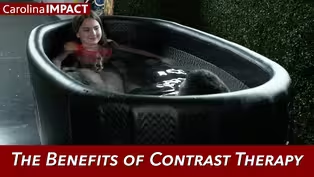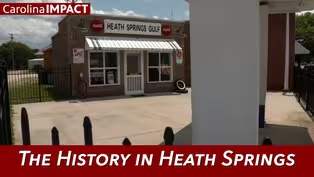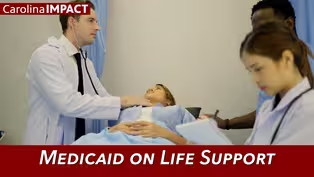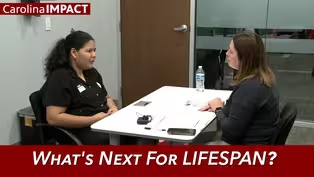
April 29, 2025 | Carolina Impact
Season 12 Episode 1224 | 28m 4sVideo has Closed Captions
Medicaid on Life Support, What's Next For LIFESPAN, Benefits of Contrast Therapy, & Heath Springs
Medicaid cuts threaten healthcare access for 2 million NC residents, reshaping lives; LIFESPAN Services, helping those with IDD Intellectual and/or developmental disabilities; Learn the benefits of contrast therapy; & Heath Springs, SC – A small town with historic charm and opportunity.
Problems playing video? | Closed Captioning Feedback
Problems playing video? | Closed Captioning Feedback
Carolina Impact is a local public television program presented by PBS Charlotte

April 29, 2025 | Carolina Impact
Season 12 Episode 1224 | 28m 4sVideo has Closed Captions
Medicaid cuts threaten healthcare access for 2 million NC residents, reshaping lives; LIFESPAN Services, helping those with IDD Intellectual and/or developmental disabilities; Learn the benefits of contrast therapy; & Heath Springs, SC – A small town with historic charm and opportunity.
Problems playing video? | Closed Captioning Feedback
How to Watch Carolina Impact
Carolina Impact is available to stream on pbs.org and the free PBS App, available on iPhone, Apple TV, Android TV, Android smartphones, Amazon Fire TV, Amazon Fire Tablet, Roku, Samsung Smart TV, and Vizio.

Introducing PBS Charlotte Passport
Now you can stream more of your favorite PBS shows including Masterpiece, NOVA, Nature, Great British Baking Show and many more — online and in the PBS Video app.Providing Support for PBS.org
Learn Moreabout PBS online sponsorship(upbeat music) - [Announcer] This is a production of PBS Charlotte.
(upbeat music) - Just ahead on "Carolina Impact," we explore how potential Medicaid cuts could impact people and organizations across our region.
Plus, jumping into ice cold water, then a sauna may sound intimidating, but will show you the health benefits of this new trend.
And we head over the border to uncover some small town history.
"Caroline Impact" starts now.
(upbeat music) Good evening, thanks so much for joining us.
I'm Amy Burkett.
A possible Medicaid cut on the horizon, sparking concern across our region, from lawmakers scrambling to soften the blow to local clinics finding innovative ways to stretch every dollar.
"Carolina Impact's" Chris Clark has the story.
(rapid whooshing) - [Chris] With $880 billion in proposed Medicaid cuts, more than 2 million North Carolinians face an uncertain future.
The repercussions could stretch from city hospitals to rural clinics, altering care and access.
- It's a huge amount of money that will cause us to have to re...
I call it reform our whole Medicaid system.
- It's frustration and a little bit of anger set up there, particularly here in North Carolina.
We spent a lot of time getting to the point where we were going to get the funds for Medicaid that are gonna trickle down to us.
- [Chris] Last year, $6.2 billion of North Carolina's $30 billion state budget was allocated to Medicaid, with a significant portion going towards Medicaid For All that began in December of 2023.
It provides coverage for residents age 19 and older earning $20,000 or less annually.
And today, over 650,000 people are enrolled.
Healthcare leaders call it a transformative step for access in the state.
But now, it's at risk of being one of the first casualties in the face of proposed cuts.
- Anybody that's been in North Carolina for any amount of time knows how long it took us to get here.
And it's predicated on the fact that the federal government is going to continue to fund Medicaid expansion.
So we've got that trigger in place that if the Medicaid expansion funding that we're getting from the federal government drops below 90%, Medicaid expansion goes away.
And once that genie's outta the bottle, it's hard to get it back in.
- [Chris] It will also be more expensive.
Under Medicaid For All, people get preventative care.
They don't have to wait to get checked when they're sick, which often leads to more expensive visits to the ER.
- The emergency room, for all intents and purposes, will effectively be their primary care physician.
- [Chris] On average, ER costs are often five to 10 times higher than a primary care visit.
- It's not just compassion, but it makes good business sense.
Last year they did a study on our impact as a clinic.
And just from this one clinic, we represented a savings of $8 million back to the closest hospital.
And our budget's not even close to $8 million.
- [Chris] Cuts to Medicaid threaten not just the program itself, but also the Affordable Care Act, which relies on Medicaid funding.
For cancer survivor, Jennifer Snowhite, this is a matter of life or death.
- I noticed a lump in my breast a couple of years ago.
It was in the middle of the pandemic.
But it was tiny, so I was pretty sure it was a cyst and ignored it for two months.
And then the next month, I felt something the size of a golf ball.
- [Chris] Thanks to her health coverage under the ACA, Jennifer was able to act quickly.
- Within days, I had gotten the information that I needed a mastectomy (fingers snapping) like that.
And if it hadn't all gone so smoothly and so quickly, I just...
I can't even imagine what would've happened.
- [Chris] Healthcare access became even more critical when her husband faced a life-threatening cancerous tumor of his own.
Snowhite credits the Navigator program with securing the right coverage for her husband and saving his life, something she fears could become unattainable for others if Medicaid cuts happen.
- Without coverage, we'd both be dead.
Our kid would be an orphan.
You know, we wouldn't be working, producing, living happy lives.
- [Chris] With every option on the table, lawmakers have batted around ideas.
The first is having a work requirement for expanded Medicaid.
- So if you were working poor, you would be eligible for that expanded population.
- [Chris] Some people may lose eligibility if they can't meet the work requirement due to health issues or caregiving responsibilities.
Supporters believe this is gonna encourage people to find jobs that may offer employer-sponsored health insurance, reducing their reliance on Medicaid.
Telehealth, where patients have appointments with doctors online or over the phone, is an area that seems to be incredibly cost-effective at both reducing healthcare costs and helping patients.
- What we're finding is that we can resolve the tactical piece of healthcare in five minutes over the phone or, you know, three minutes via text.
So the efficiency is much greater.
And then the economic impact on the community's greater.
Because now, the person doesn't have to take a whole day off work to come and sit and wait.
- [Chris] Others are looking at eliminating redundancy by combining services from hospital group to hospital group.
Allowing different hospitals to share patient records will cut costs, along with rewarding hospitals for performance measures.
- Do you know which is the best performing hospital in North Carolina?
No, nobody knows.
Now, do you think you know?
Well, is that because of the marketing campaigns?
Is it because of the basketball team?
What do you think measures quality in our healthcare system in North Carolina?
We don't measure quality.
- [Chris] North Carolina faces some tough decisions, including the possible elimination of unique programs, like the Health Opportunities Pilot.
This initiative addresses critical needs beyond medical care, such as housing assistance, food access, and transportation to medical appointments.
Another option on the table is freezing reimbursement rates paid to healthcare providers, a move that could strain services, but help control costs.
- Will they like that?
Not likely.
But is it a matter of cutting back a program or taking people off the Medicaid rolls, versus everybody's gonna have a freeze in their rates?
- [Chris] The state did buy itself some time to navigate these challenges.
- We've actually been building up some reserves for Medicaid, knowing that we may have to phase down some of these reductions, so that it's not just...
I call it cold turkey, where all of a sudden you're covered one day, and the next day, you're not.
It might be January before we eliminate a certain segment of those services.
- [Chris] The true anxiety stems not just from the cuts of the programs on the chopping block.
It's the unsettling uncertainty of how these changes will disrupt and reshape lives.
- One in five seniors who rely on Medicaid for their senior living facilities, where are they gonna go?
And it's gonna be up into 300,000 children are gonna be impacted.
If you wanna see what people really care about, look at how they spend their money.
'Cause that's the clearest way you'll see where their priorities are.
- [Chris] As lawmakers weigh the consequences, the uncertainty about who will be affected and how remains the most unsettling aspect for families.
For "Carolina Impact," I'm Chris Clark.
- Thank you, Chris.
The federal government is currently funded through September 30th under a resolution that was passed back in March.
But the House of Representatives is set to take up a major domestic policy bill in early May.
It could cut $880 billion from programs, like food assistance, infrastructure, and Medicaid.
Well, if you know anyone looking for a job these days, you know it's tough.
Between all the job sites, algorithms, and gatekeepers, most jobs seekers say they feel like they're applying into a black hole.
But imagine how much harder it could be if you are at a real disadvantage.
"Carolina Impact's" Jason Terzis joins us with more.
- In the United States, The average job search tends to last about five months or so, which is actually not too bad when you consider a significant portion of openings are never publicly advertised, or already filled Internally when they are advertised.
And get this.
It's estimated that 75% of resumes and applications are rejected by computers, applicant tracking systems, before hiring managers even lay an eye on 'em.
If it's that hard for the average person to land a job, imagine how hard it is for someone at a disadvantage.
(rapid whooshing) (upbeat music) It's another day on the job for Ben Steinman at the subway on Eastway Drive in Charlotte, wiping down tables and chairs and sweeping the floors, all necessities in the food service industry.
What do you do here?
- Clean the tables, your toilets, back there.
Sweep, sweep the table, sweep, sweep.
- [Jason] You help keep the place clean.
- Right.
- [Jason] It's a job Ben has been doing quite a while now.
- Six years.
- [Jason] Six years?
- Yes.
- [Jason] You've been here for six years?
I'm assuming you like it.
- Yeah, I like it a lot.
- We hope Ben never stops working here, honestly.
- [Jason] Ben has what's known as an IDD, an intellectual and/or developmental disability, specifically fragile X syndrome, which is a genetic condition.
But through his work ethic and personality, Ben's grown to be a big part of the Subway family.
- Ben's been like family ever since, like a little brother to me, honestly.
Right, Ben?
- I like you.
- He's always very happy.
And he works hard in here.
If he makes a mistake, he apologizes every single time, even when he doesn't need to.
- [Jason] Subway owner, Drew Hawkins, took a chance on Ben and it's worked out.
- You can't judge a book by its cover, first of all.
You have to give people a chance.
- [Jason] Unfortunately though, not nearly enough employers do.
- Of adults ages 21 to 64 who have an IDD and want to work and can work, only 34% of them are able to find jobs.
We have to educate the employers in the market that there's a whole sector of people here who wanna work, and can work, and will be the best employee that you hire.
You just need to be aware that they're there.
- [Jason] IDD refers to those with Down syndrome, autism, cerebral palsy, and other mental or physical disabilities - In the state of North Carolina, it is estimated that almost 200,000 individuals are diagnosed with IDD.
And of those 200,000, only about 17 to 18,000 receive the services that they deserve and need.
- [Jason] And that's where Lifespan Services comes in.
- We help children and adults with intellectual and developmental disabilities live, work, and play in their communities.
- We're helping individuals who have been told their whole life that they're the least and the last.
They have been discriminated against because of their differing abilities.
But Lifespan comes along and says let's illuminate your abilities.
What are you good at?
What do you want to do?
And so, our team works with them to figure out what their gifting is, what their expertise is.
So it gives them a purpose.
It gives them a life.
- [Jason] The lifespan story is one that dates back more than 50 years.
- Lifespan was birthed out of necessity.
Back in 1973, there were five kids in the Charlotte School system with differing abilities who were unable to get the education they needed.
- [Jason] Members from St. Mark's Lutheran Church created an educational day program to help those students.
- A gentleman named Lee Derby heard about it.
And he worked with St. Mark's Lutheran Church.
And Lee Derby and the church took those five students, picked them up every day in a Volkswagen white and red bus, and took them to a Sunday school room and delivered the education that they deserved and needed.
- 'cause we're called Lifespan because we helped throughout the entire lifespan.
So literally from six weeks old until whenever, (laughs) until it's that time, so their entire life.
- [Jason] Today, Lifespan serves about 1500 individuals across 23 North Carolina counties, including eight creative campuses, three inclusive childcare facilities, and nine group homes.
- We also have residential facilities where individuals live with us and they're cared for 24/7.
- [Jason] At the Lifespan Creative Campus, Center City, individuals enjoy various art and horticulture programs.
- You can learn yourself in Lifespan.
I feel excited to be here.
- When we do that and provide that service, we are also providing respite for their parents or guardians.
And so, while their individual, their son, their daughter, their niece, or their nephew is with Lifespan, they are able to go out.
And mom or dad are able to keep their jobs.
- [Jason] Lifespan also pairs individuals with life coaches with the ultimate goal of finding and keeping a job.
- You give Lifespan a chance because they're confident enough to bring their client out here.
And I was willing to give him a chance.
And he proved me to be fortunate.
- [Jason] Lifespan was just one of several organizations recently taking part in the second annual Abilities Employment Symposium.
- I was here last year.
It was probably around 100.
We're at 250, 300 folks today, which is amazing.
Amazing.
The more that we're exposed to understanding how we can do this together, the better off we are as a community, plain and simple.
There's a lot of fear factors, a lot of things people don't understand.
Well, you bust down all those walls just by attending events like this.
- [Jason] The symposium featured networking, school and job training programs, and perhaps most important of all, mock interviews for individuals to practice their skills.
- What do you like best about working there?
What's your favorite thing about working there?
- Greet the... Greet the customers.
- Greeting the customers, okay.
- Mock interviews, how cool is that to get a chance to do a mock interview?
Practice while you're here.
Learn that you need to smile.
I've heard that 5 million times out there.
As long as I wear my smile, I can get the job.
Well, I'm gonna believe in that too, right?
- [Jason] The goals are education, enrichment, and employment.
But a good portion of Lifespan's mission is simply changing people's perspectives about those with IDD, - We see someone coming down the sidewalk in a wheelchair, we will subliminally and literally cross the road and go down the other side of the sidewalk because we don't want to engage, why?
'Cause we don't know how.
We don't know what to say.
But my point here is in telling the story, be part of the story.
Interact with somebody who has an IDD.
Speak to that person in a wheelchair.
Call them by their name.
Don't talk about their disability.
Don't diss their ability.
But just invite them in and say, "Hey, how you doing?
Where are you going?
What are you doing today?"
Thats the kind of story that changes lives.
- So I'm a huge fan of Lifespan.
They do amazing work throughout this area.
What else did you uncover when working on this story?
- Well, like most nonprofits, lifespan relies heavily on individual giving, with 63% of its funding coming from personal donations and just 7% from corporate sponsorships.
The other 40% is made up of grants through the city, county, state, and federal governments.
But as we've been talking about it, and it's so much in the news lately, with all the potential cuts to federal government, and budgets, and nonprofits, they could be losing some funding, as so many other nonprofits.
So they're running the risk of that.
And kinda waiting to see what happens there in the federal government.
- Thanks so much for sharing.
- Mm-hm.
- Well, I've got a question for you right now.
Would you be willing to jump into near freezing water, and then sweat in 100 degree room?
Well, if I told you it's good for you, would that change your mind?
"Carolina Impact's" Dara Khalid and videographer Marcellus Jones show us how contrast therapy is a trend that actually comes with health benefits.
- [Dara] You've likely seen it all over social media.
People hopping into ice cold water cold plunging, then heating up their bodies, getting a good sweat in a sauna.
This trend, taking the internet and our region by storm... - People always want to do the trendy things.
- [Dara] Is called contrast therapy, which means going back and forth from extremely cold to extremely hot temperatures, or vice versa.
- You're gonna feel some different things that you normally don't feel.
- [Dara] Here at Freedom Longevity and Wellness in Terrell, you'll find the whole setup from tubs that reach near freezing temperatures... - We have chillers that run water into the cold plunge themselves.
The running water stops you from creating that thermal barrier - [Dara] To high-tech saunas.
- We like using infrared over a dry sauna because it helps to actually pull the inflammation out of the body.
- [Dara] You may be wondering, what's the point in doing all of this?
Well, experts say there are several benefits, like improved circulation, boosted immunity, increased metabolism, and muscle recovery.
- Like the way I explain it to people is hot relaxes the body, gets the muscles to relax, brings the inflammation out.
The cold sets the muscles around the joints.
- [Dara] And for Andrew Sheybani-Agdam, his job as a nurse puts his body through a lot.
He sees contrast therapy as relief.
- I had a lot of like lower back pain, probably from moving people and nurse work.
So the first time that I came and did the contrast therapy, I noticed that like my back didn't hurt quite as bad.
- [Dara] This is something his coach, Ben Prince, can relate to.
- I got hurt overseas, lost a lot of guys overseas in in that moment.
(gentle music) Cold plunges saved me.
(gentle music) - [Dara] In 2009, the Army veteran was injured in a tragic incident during deployment.
He was then medically retired and prescribed medications that he says did more harm than good.
- I tried to commit suicide twice 'cause I couldn't live without... (sniffles) (gentle music) Sorry.
(sniffles) (gentle music) I didn't think I could live without 'em.
- [Dara] But after giving contrast therapy a try, the pain got better.
- I did 'em every day for a full year.
Ended up coming off medications slowly throughout that year and seeing the change.
- [Dara] And in January, 2024, he got to see others benefit in the same way when he and his business partner, Tony Gentile, opened the facility.
- We fell in love with being able to help people.
- [Dara] But at Freedom, they didn't just stop with tubs and saunas.
They have other amenities that help folks get the most out of contrast therapy, like a hyperbaric chamber, which speeds up recovery by adding oxygen to the bloodstream, and compression boots.
- It helps with circulation in your legs, metabolic waste.
I'm a nurse, so I'm on my feet a lot.
So this is definitely a nice way to relax and recover after working a shift.
- [Dara] And back in Charlotte... - Hi, how are you?
(client chatters) - [Dara] There's another business adding creative twists to contrast therapy.
- We've always kind of been about extremes.
- [Dara] At Arrichion Hot Yoga and Circuit Training, they like it hot in their yoga classes.
And by a hot, I mean... - You're probably looking at about 110 degrees within the room.
And we have about 80% humidity.
So it's not gonna feel like a dry heat.
- [Dara] Which means you can swap out the traditional sauna for one of these classes.
- Get nice and sweaty, and then do a cold plunge afterwards to kind of get the same type of benefits, just like you would be if you were coming out of the sauna into the cold plunge tub.
- [Dara] Regardless of how you slice and dice the hot portion of your session, professionals say this should be a constant.
- 11 minutes of cold plunging per week for like optimal benefits.
And that can be combined in any way, shape, or form really.
So you can do like two minutes one day, and five minutes the next day, and 30 seconds the next day, and things like that.
- [Dara] And just how there are physical benefits to contrast therapy, there are psychological benefits too, like stress relief and... - My mental clarity throughout the day have been, you know, noticeable during the last few months that I've been doing it consistently.
- [Dara] Medical experts say contrast therapy isn't for everyone, particularly those with diabetes, circulatory conditions, like hypertension, skin conditions, like eczema, and pregnant women.
- Three, two, one.
- [Dara] But if you are able to take that plunge or sweat it out in that sauna, experts say pushing through the discomfort is worth it for what you gain in the end.
For "Carolina Impact," I'm Dara Khalid.
- Okay, just watching it, I'm cold and hot at the same time.
Thanks so much, Dara.
Another big thing experts remind people of is staying hydrated in both portions of contrast therapy.
Yes, even the cold part.
Don't let the plunge trick you into thinking you don't need water.
Just because you're not sweating, be sure to drink up.
Wrapping things up tonight, springtime is often a wonderful time to explore.
If you head over the border to South Carolina, you'll find a small town that has a bit of Revolutionary War history, Civil War history, and a local pizza spot that attracts people from all over.
"Carolina Impact's" Jason Terzis and producer John Branscum take us to Lancaster County to visit Heath Springs.
(rapid whooshing) (gentle music) - [Jason] Take a drive through Heath Springs, South Carolina.
And for some, it may seem like just another town that time forgot.
But the town that doesn't have a stoplight has a few stories to tell and a few stories still being written.
- Believe it or not, we got people coming from Columbia and from Charlotte just for the pizza.
- [Jason] That's right, folks driving for more than an hour to grab a slice at Heath Springs Pizzeria, the brainchild of Steve Myers.
- When you Google Heath Springs, I mean, the pizzeria comes up first.
- [Jason] Now, Myers admittedly isn't from around these parts.
- I'm originally from Fort Wayne, Indiana.
By trade, I'm an IT guy during the day.
So I'm a computer geek.
My passion has always been Italian food.
And I wanted to open up a pizza restaurant.
- [Jason] Over the last decade or so, he's been perfecting his pizza pies.
- I know what I'm doing when it comes to New York style pizza.
And it's not the water, okay?
It's the way you make your dough, the way you put the love and passion behind it.
- [Jason] Now, it may not be the water making the difference at Heath Springs Pizzeria, but there was a time folks flocked to the area for just that, the water.
- [Kip] There's a mineral springs there.
And the water doesn't taste very good.
And the result of that is that people naturally think it's good for you if it tastes bad.
And so, people came here starting in the late 1700s to get that water.
(truck rumbles) (gentle music) - [Jason] To get to the springs, folks traveled the Great Wagon Road, the very road local historian Kip Carter's house has sat on for more than two centuries.
- The state architectural historian looked at this house and said that he thought it was built about 1790, which was 10 years after the Battle of Hanging Rock, which was in 1780.
- [Jason] The Battle of Hanging Rock happened just down the road from Carter's house on land, now owned by the South Carolina Battleground Preservation Trust.
- There were two Battles of Hanging Rock here.
The first one's August 1st, 1780.
That was led by William Richardson Davie, who later founded the University of North Carolina, was governor of North Carolina.
- [Jason] The second Battle of Hanging Rock, according to Carter, took place on August 8th, 1780.
- And about that time, General Gates showed up with the southern army and was moving down this road in front of the house toward Camden.
But Cornwallis had come up from Charleston with 2,000 troops.
And they met just on this side of Camden.
And the American troops were defeated.
- [Jason] Fast forward about eight decades, and this area, once again, saw the horrors of war.
Carter says during the Civil War, a well-known Union General passed through the area.
- Among the people that came here was William Tecumseh Sherman after he burned Columbia.
And he used my house here as his headquarters for the last three days of February of 1865.
(gentle music) - [Jason] During the 18th and most of the 19th century, the area was known as Mineral Springs.
But around the corner, a name change was on the horizon.
- About 1889, a guy from Monroe named Benjamin Heath bought the land where the spring is.
And so, they started calling it Heath's Spring.
Things started growing up around here.
And so, they decided to incorporate the town.
And so, the town of Heath Springs was founded in about 1890 and grew into a sizable little community.
- [Jason] When the Great Depression crippled the nation during the 1930s, the Works Progress Administration selected Heath Springs for a project.
- It was a big deal.
You know, there were no jobs to be had.
- [Jason] Once again, the area's water played an essential role.
Welcome to the Springs Stevens Fish Hatchery, located on Hanging Rock Creek.
The South Carolina Department of Natural Resources operates a total of five fish hatcheries.
Spring Stevens Hatchery Manager, Sterling Brumbaugh, says the fish raised here stock public lakes and rivers in the state.
- Fishermen harvest the fish.
We're able to restock, you know, more numbers, help increase the population.
Also, populations that might be lacking, we're able to help boost those populations.
These production ponds are used for mainly two species of fish.
That being redbreast sunfish and striped bass.
I really take pride in what I do.
Being able to go out and supply a resource for fishermen and recreational users really means a lot.
And for that to be a part of Heath Springs, I think amplifies the town.
- [Jason] It's just north of the Hanging Rock Battlefield, and near the actual rock formation known as Hanging Rock.
It's open to the public.
But sorry, no fishing.
(gentle music) Back in town, longtime residents say things are changing.
- The town is starting to revive now.
We're starting to make a a pretty good comeback here.
- [Jason] And part of that comeback, of course, Heath Springs Pizzeria, where owner Steve Myers gets a little emotional when asked what it means to be a part of this small town.
- It's humbling, very humbling.
(gentle music) I'm a passionate guy.
I love people, especially people that do you right, you know?
But to see that they care for you and what you've done for them... And I love this little town.
I wanna see this town to be like one of them little Hallmark channel towns, right, where Hallmark comes in and says, "Hey, let's do a movie here."
That's my passion, that's my goal.
- [Jason] For "Carolina Impact," I'm Jason Terzis reporting.
- I just found another place I'd like to visit.
Thanks, Jason.
Now, if you're interested in Revolutionary War battlefield road trip that includes the Battle of Hanging Rock outside of Heath Springs in South Carolina, the Battlefield Preservation Trust has created the Liberty Trail that takes you to all the Revolutionary War battlefields in the state.
Well, do you know an amazing story like this one?
We'd love to learn about it.
Please email details to stories@wtv.org.
Before we go this evening, I wanna thank an amazing group of elementary homeschoolers from the southwestern part of our region who are here in the studio audience today asking great questions.
We love it when folks come to visit us.
Well, that's all the time we have this evening.
Thanks so much for joining us.
We always appreciate your time and look forward to seeing you back here again next time on "Carolina Impact."
Good night, my friends.
(rapid whooshing) (upbeat music) - [Announcer] This is a production of PBS Charlotte.
(upbeat music fades)
April 29, 2025 Preview | Carolina Impact
Preview: S12 Ep1224 | 30s | Medicaid on Life Support, What's Next For LIFESPAN, Benefits of Contrast Therapy, & Heath Springs (30s)
The Benefits of Contrast Therapy | Carolina Impact
Video has Closed Captions
Clip: S12 Ep1224 | 5m 16s | Learn the benefits of contrast therapy. (5m 16s)
The History in Heath Springs | Carolina Impact
Video has Closed Captions
Clip: S12 Ep1224 | 5m 48s | Heath Springs, SC – A small town with historic charm and opportunity. (5m 48s)
Medicaid on Life Support | Carolina Impact
Video has Closed Captions
Clip: S12 Ep1224 | 6m 38s | Medicaid cuts threaten healthcare access for 2 million NC residents, reshaping lives (6m 38s)
What's Next For LIFESPAN? | Carolina Impact
Video has Closed Captions
Clip: S12 Ep1224 | 7m 40s | LIFESPAN Services, helping those with IDD Intellectual and/or developmental disabilities. (7m 40s)
Providing Support for PBS.org
Learn Moreabout PBS online sponsorship
- News and Public Affairs

Top journalists deliver compelling original analysis of the hour's headlines.

- News and Public Affairs

FRONTLINE is investigative journalism that questions, explains and changes our world.












Support for PBS provided by:
Carolina Impact is a local public television program presented by PBS Charlotte




